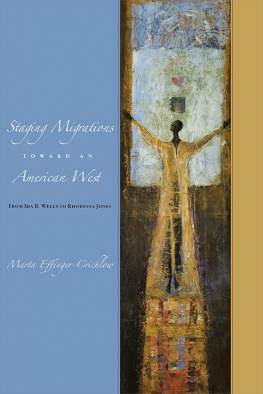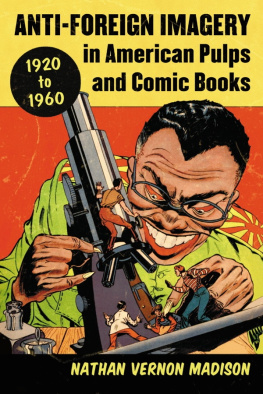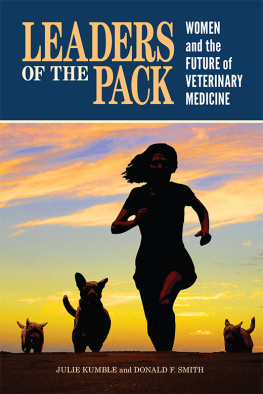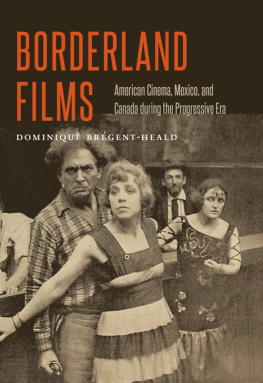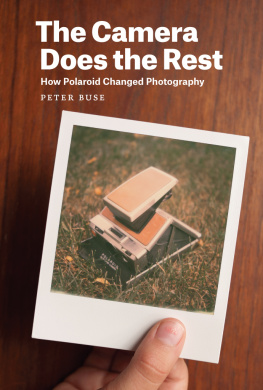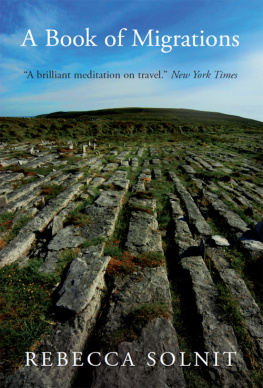Staging Migrations toward an American West
From Ida B. Wells to Rhodessa Jones
Marta Effinger-Crichlow
University Press of Colorado
Boulder
Staging Migrations toward an American West
Staging Migrations toward an American West
2014 by University Press of Colorado
Published by University Press of Colorado
5589 Arapahoe Avenue, Suite 206C
Boulder, Colorado 80303
All rights reserved
Printed in the United States of America

The University Press of Colorado is a proud member of the Association of American University Presses.
The University Press of Colorado is a cooperative publishing enterprise supported, in part, by Adams State University, Colorado State University, Fort Lewis College, Metropolitan State University of Denver, Regis University, University of Colorado, University of Northern Colorado, Utah State University, and Western State Colorado University.
This paper meets the requirements of the ANSI/NISO Z39.48-1992 (Permanence of Paper).
Library of Congress Cataloging-in-Publication Data
Effinger-Crichlow, Marta.
Staging migrations toward an American West : from Ida B. Wells to Rhodessa Jones / Marta Effinger-Crichlow.
pages cm
Includes bibliographical references.
ISBN 978-1-60732-311-2 (cloth : alk. paper) ISBN 978-1-60732-312-9 (ebook)
1. African American womenWest (U.S.)Social conditions. 2. African AmericansMigrations. 3. African American women entertainers. 4. Migration, InternalUnited StatesHistory19th century. 5. African American womenWest (U.S.)History. I. Title.
E185.925.E44 2014
305.48'896073078dc23
23 22 21 20 19 18 17 16 15 14 10 9 8 7 6 5 4 3 2 1
Acknowledgments
This book in many ways was made possible because of the advice, generosity, and encouragement of countless individuals. I will always appreciate the invaluable research assistance offered by the numerous archivists and librarians who graciously responded to my many requests. I am so thankful to the Moorland-Spingarn Research Center Collection at Howard University; the Schomburg Center for Research in Black Culture and the Billy Rose Theatre Division of the New York Public Library; the Hatch-Billops Collection; the Center for Black Music Research at Columbia College Chicago; the Western History/Genealogy Department of the Denver Public Library; History Colorado (also known as the Colorado Historical Society); the Norlin Library at the University of Colorado Boulder; the Bancroft Library at the University of California, Berkeley; the Oakland Museum of California; the Institute of Jazz Studies at Rutgers University; the San Francisco Public Library; the Newberry Library; the Chicago History Museum (also known as the Chicago Historical Society); the Brooklyn Public Library; the Museum of the City of New York; the Tennessee State Library and Archives; the Memphis Public Library and Information Center; the Labor Archives and Research Center at San Francisco State University; the Joseph Regenstein Library at the University of Chicago; the Milton S. Eisenhower Library at Johns Hopkins University; the Tulare County Library in Visalia, California; the Records of the National Council of Negro Women at the Bethune Museum and Archives, Washington, DC; the Ursula C. Schwerin Library at the New York City College of Technology, CUNY; and the Interlibrary Loan office at Northwestern University.
During the early life of this project, I benefited from the careful eyes of a collection of unselfish scholars. It is appropriate that I recognize Sandra L. Richards, Margaret Thompson Drewal, and Adam Green, the members of my dissertation committee at Northwestern University. They consistently challenged and inspired me with insightful and detailed comments. Even in the midst of their hectic schedules, they met with me to listen to my ideas and to review drafts. I also want to thank Tracy Davis, former director of the Interdisciplinary PhD in Theatre and Drama program, and the administrative staff for their support. I will always be grateful to Robert Gundlach of Northwestern for helping me find my way through a sea of notes and for reading early outlines of this project. I continue to treasure his attention and patience. I also owe my gratitude to stellar scholars like Josef Barton, John Graziano, James Hatch, Darlene Clark Hine, Judith Stephens, and Ethel Pitts Walker for their keen insights. Their passion for scholarship is contagious.
Early funding support from the following fellowships helped me undertake this project: the Committee on Institutional Cooperation (CIC) Fellowship; the Dissertation Year Grant from the University Research Grants Committee at Northwestern University; the American Society for Theatre Research Fellowship; and the Northwestern University Fellowship. I am also appreciative of Penny Warren and Leila S. Edwards in the Graduate School at Northwestern.
Discussions with dear friends and colleagues Hsiu-chen Lin Classon, Latonia Harris, Pamela Harkins, Wheaton James, Anthea Kraut, Norma Jean OGarro, Deborah Paredez, and E. Angelica Whitmal were particularly beneficial during the early years of this project. I am truly honored to share a friendship with Tiffany Ellis-Butts, Jasmin Eve Lambert, and Deshanta Rhea, whose humor, unselfishness, and critiques have served me well for several years. It is what books, plays, songs, and movies are made of.
The Association for Theatre in Higher Education (ATHE) and the Association for the Study of African American Life and History (ASALH) have proven to be critical resources for my research. More importantly, brilliant individuals in the Department of Africana Studies (formerly Black Studies) at the University of Pittsburgh, the Department of African American Studies at Yale University, and the Black Theatre Network (BTN) nurtured me in my early academic career. I am most thankful to scholars and artists like Vernell A. Lillie and Paul Carter Harrison, whose commitment to the study of Africana people in theater has influenced my teaching and scholarship.
Throughout my travels, I have met individuals who warmly led me to crucial sites and voices. I owe a debt of appreciation to the late Harold L. Patton, who allowed me to peruse his extraordinary private collection in Los Angeles. Lonnie Washington, former mayor of Richmond, California, and Amy Holloway, former staff member at the San Francisco African American Historical & Cultural Society, enhanced my knowledge by serving as magnificent guides around the Bay Area. In addition, I am thankful to Moya Hansen of History Colorado; Donna Graves and Kathleen Rupley of the Rosie the Riveter project at the Richmond Museum of History; Sue Fritzke and Luther Bailey of the Rosie the Riveter World War II Home Front National Historical Park; Community Works; the University of California, Berkeley Faculty Club staff; Bay Area photographers and artists Lorraine Capparell, Stephanie A. Johnson, and Pam Peniston; and Cultural Odyssey of The Medea Project: Theater for Incarcerated Womennamely, Sean Reynolds, Sanae Ishida, Lawrence Andrews, and Idris Ackamoor.
The guidance given to me by my editor, Jessica dArbonne, and Darrin Pratt, Daniel Pratt, Laura Furney, Diane Bush, and the staff and anonymous reviewers at the University Press of Colorado (UPC) will always be valued. UPC, thank you for believing in my work. In addition, I am thankful to the African American Studies Department and Faculty Commons, both at the New York City College of Technology, CUNY, for their encouragement throughout the revision process.

